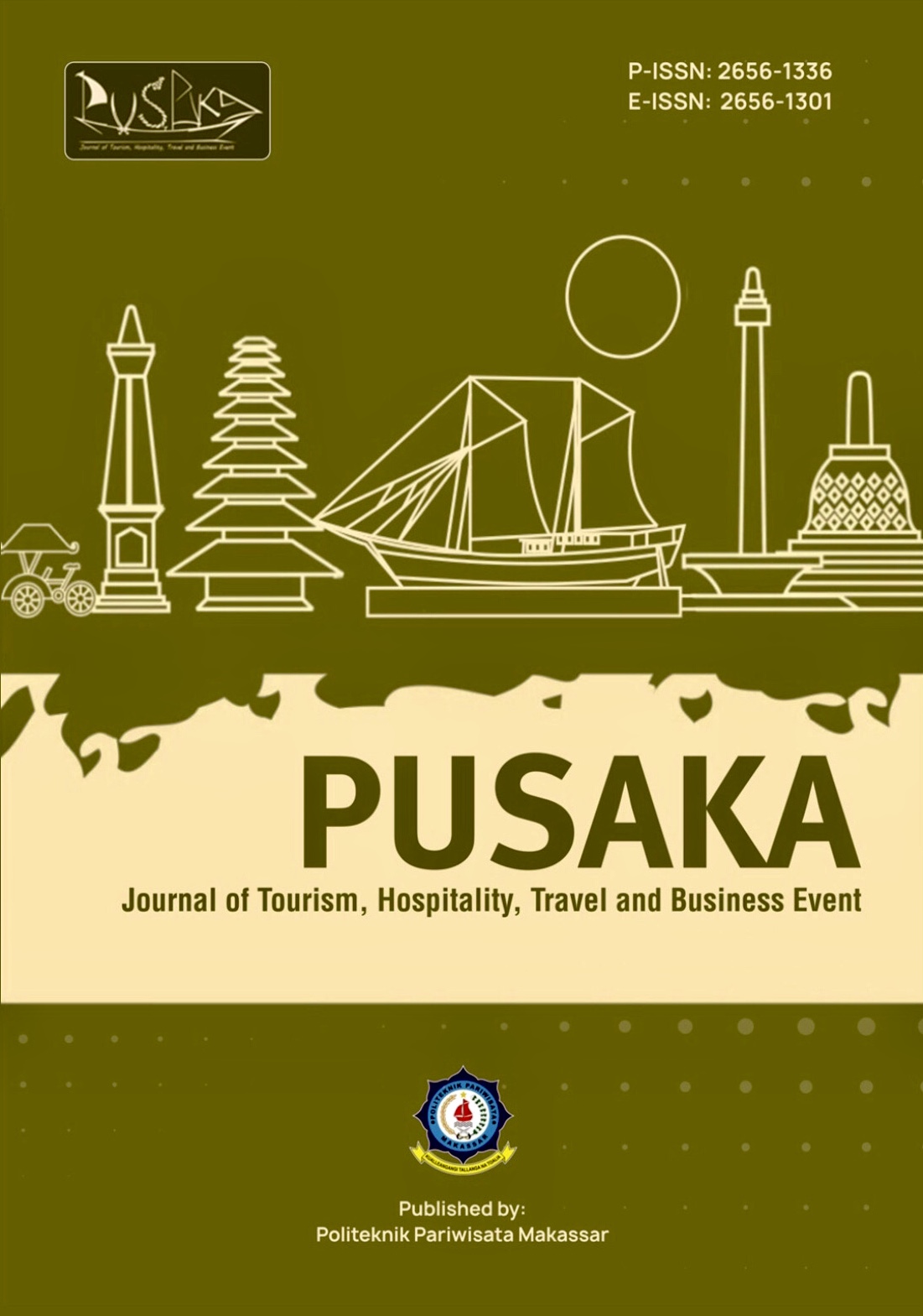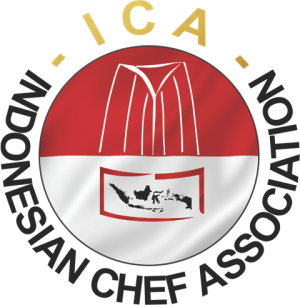Voluntourism: Motivations of Gen Z Participants in Bali
DOI:
https://doi.org/10.33649/pusaka.v6i1.295Keywords:
Gen Z, Motivation, VoluntourismAbstract
Voluntourism is becoming increasingly popular among Generation Z (Gen Z) in Indonesia. This study examines the motivations of Gen Z volunteer tourists who participate in voluntourism activities in Bali. This study used a qualitative descriptive approach. The informants comprised twenty-six Gen Z tourists in Indonesia, all selected through non-probability and snowball sampling. The result shows that Gen Z tourists are motivated by push and pull factors, including helping others, gaining new experiences, meeting new friends, personal development and growth, cultural interest, visiting Bali, and personal interest in specific volunteering activities. This study provides an in-depth insight into how Gen Z views voluntourism as a means to explore exotic destinations such as Bali and as an opportunity to contribute to the local community positively. The implications of these findings can provide valuable guidance for the tourism industry and volunteer organizations to develop more relevant and meaningful voluntourism programs for Gen Z.
References
Adha, M. M. (2015). Understanding The Relationship Between Kindness And Gotong Royong For Indonesian Citizens in Developing Bhineka Tunggal Ika.
Adha, M. M., Budimansyah, D., Kartadinata, S., & Sundawa, D. (2019). Emerging volunteerism for Indonesian millennial generation: Volunteer participation and responsibility. Journal of Human Behavior in the Social Environment, 29(4), 467–483. https://doi.org/10.1080/10911359.2018.1550459
Ajzen, I. (1991). The Theory of Planned Behavior.
Ali, N. J., & Rahman, A. (2019). Why do people opt for voluntourism in Bangladesh? An exploratory study. In Journal of Tourism Quarterly Research Article (Vol. 2019, Issue 1)
Arcgis. (2017). A short history of the United Nations Volunteers. https://www.arcgis.com/apps/MapJournal/index.htm l?appid=ed74eaf4650341cdad6a0f7df2b5bd10
Asy’ari, R. (2022). VOLUNTOURISM : PARIWISATA DAN SUKARELAWAN. Warta Pariwisata, 20(1), 7–9. https://doi.org/10.5614/wpar.2022.20.1.02
Badan Pusat Statistik. (2023). Perkembangan Pariwisata dan Transportasi Nasional Juni 2023.
Chacón, F., Gutiérrez, G., Sauto, V., Vecina, M. L., & Pérez, A. (2017). Volunteer Functions Inventory: A systematic review. In Psicothema (Vol. 29, Issue 3, pp. 306–316). Colegio Oficial de Psicologos Asturias. https://doi.org/10.7334/psicothema2016.371
Cho, M., Bonn, M. A., & Han, S. J. (2018). Generation Z’s sustainable volunteering: Motivations, attitudes and job performance. Sustainability (Switzerland), 10(5). https://doi.org/10.3390/su10051400
Davies, S. E. H. (2017). Disaster volunteerism: A utilitarian perspective. WIT Transactions on the Built Environment, pp. 173, 143–148. https://doi.org/10.2495/DMAN170141
Dill, K. (2016). 7 Things Employers Should Know About The Gen Z Workforce.
Dimock, M. (2019). Millennials-end-and-generation-zbegins/ Defining generations: Where Millennials end, and Generation Z begins. http://www.pewresearch.org/facttank/2019/01/17/where
Dinas Pariwisata Provinsi Bali. (2023). Data Kunjungan.
Dolot, A. (2018). The characteristics of Generation Z. EMentor, 74, 44–50. https://doi.org/10.15219/em74.1351
Germann Molz, J. (2017). Giving Back, Doing Good, Feeling Global: The Affective Flows of Family Voluntourism. Journal of Contemporary Ethnography, 46(3), 334–360. https://doi.org/10.1177/0891241615610382
Hallmann, K., & Zehrer, A. (2016). How do perceived benefits and costs predict volunteers’ satisfaction? VOLUNTAS: international journal of voluntary and nonprofit organizations, 27(2), 746- 767. . https://doi.org/10.1007/s11266-015-9579-x Handayani, R. (2020). Seminar daring bertajuk “ New Nomal Stage.” .
Han, H., Meng, B., Chua, B. L., Ryu, H. B., & Kim, W. (2019). International volunteer tourism and youth travelers–an emerging tourism trend. Journal of Travel and Tourism Marketing, 36(5), 549–562. https://doi.org/10.1080/10548408.2019.1590293
Herdiawan, J., Riyadi, I. A., Ridwan, C., Solikhah, & Palupi, A. A. (2018). Mendulang Devisa Melalui Pariwisata. www.bi.go.id
Jakubiak, C. (2020). “English Is Out There—You Have to Get with the Program”: Linguistic Instrumentalism, Global Citizenship Education, and English-Language Voluntourism. Anthropology and Education Quarterly, 51(2), 212–232. https://doi.org/10.1111/aeq.12332
Ji, Eun-Sun, Mi-Seon, & Ka-Ka. (2020). Association between a Motivation to Volunteer, Personality, and Interpersonal Relationships in Nursing College Students. Journal of East-West Nursing Research, 26(1), 100–107. https://doi.org/10.14370/jewnr.2020.26.1.100
John, S. P., & Larke, R. (2016). An analysis of push and pull motivators investigated in medical tourism research published from 2000 to 2016. Tourism Review International, 20(2–3), pp. 73–90. https://doi.org/10.3727/154427216X147131048558 10
Kazandzhieva, V. (2014). VOLUNTEER TOURISM IN BULGARIA. https://www.researchgate.net/publication/26620742 1
Kim, E., Fredline, L., & Cuskelly, G. (2018). Heterogeneity of sport event volunteer motivations: A segmentation approach. Tourism Management, pp. 68, 375–386. https://doi.org/10.1016/j.tourman.2018.04.004
Korwa, L., & Mudana, I. G. (2021). Volunteer Tourism Berwisata dan Bekerja Sosial.
Kristanti, I. H., Made, N., Karini, O., & Sudana, P. (2015). KARAKTERISTIK DAN MOTIVASI WISATAWAN DALAM VOLUNTOURISM DI KABUPATEN GIANYAR (Studi Kasus Pada Yayasan Widya Guna Desa Bedulu dan Yayasan Bumi Sehat Desa Nyuh Kuning). 3(2), 73.
Kurnia Erza, E. (2020). ANALISIS KEBUTUHAN INFORMASI GENERASI Z DALAM AKSES INFORMASI DI MEDIA. Shaut Al-Maktabah : Jurnal Perpustakaan, Arsip Dan Dokumentasi, 12(1), 72–84. https://doi.org/10.37108/shaut.v12i1.303
Law Snyder, T. (2021). Part of the Higher Education Commons Recommended Citation Recommended Citation Snyder. In Journal Jesuit Higher Education: A Journal (Vol. 10, Issue 2). https://epublications.regis.edu/jhe
Leighton, K., Kardong-Edgren, S., Schneidereith, T., & Foisy-Doll, C. (2021). Using Social Media and Snowball Sampling as an Alternative Recruitment Strategy for Research. Clinical Simulation in Nursing, 55, 37–42. https://doi.org/10.1016/j.ecns.2021.03.006
Malhotra, N., Nunan, D., & Birks, D. (2017). Marketing Research: An Applied Approach.
McGloin, C., & Georgiou, N. (2016). ‘Looks good on your CV’: The sociology of voluntourism recruitment in higher education. Journal of Sociology, 52(2), 403– 417. https://doi.org/10.1177/1440783314562416
Meng, B., Ryu, H. B., Chua, B. L., & Han, H. (2020). Predictors of intention for continuing volunteer tourism activities among young tourists. Asia Pacific Journal of Tourism Research, 25(3), 261–273. https://doi.org/10.1080/10941665.2019.1692046
Michael, N., Wien, C., & Reisinger, Y. (2017). Push and pull escape travel motivations of Emirati nationals to Australia. International Journal of Culture, Tourism, and Hospitality Research, 11(3), 274–296. https://doi.org/10.1108/IJCTHR-04-2016-0039
Otoo, F. E., & Amuquandoh, F. E. (2014). An exploration of the motivations for volunteering: A study of international volunteer tourists to Ghana. Tourism Management Perspectives, 11, 51–57. https://doi.org/10.1016/j.tmp.2014.04.001
Palupi, N. W., & Salma, S. (2020). PERSEPSI TERHADAP HARAPAN ORANGTUA SEBAGAI PREDIKTOR INISIATIF PERTUMBUHAN DIRI PADA MAHASISWA GENERASI Z. Jurnal EMPATI, 9(4), 327–355. https://doi.org/10.14710/empati.2020.28963
Paramitha, N. A. (2020). FIGURASI DALAM KELOMPOK TRAVELER. https://doi.org/10.20961/jas.v9i0.39817
Paraskevaidis, P., & Andriotis, K. (2017). Altruism in Tourism: Social Exchange Theory vs Altruistic Surplus Phenomenon in Host Volunteering. Annals of Tourism Research, 62, 26–37. https://doi.org/10.1016/j.annals.2016.11.002
Parker, C. (2020). Snowball Sampling. https://doi.org/10.4135/URL
Parker, K., & Igielnik, R. (2020). On the Cusp of Adulthood and Facing an Uncertain Future: What We Know about Gen Z So Far. Pew Research Center. https://www.pewresearch.org/socialtrends/2020/05/14/on-the-cusp-of-adulthood-andfacing-an-uncertain-future-what-we-know-aboutgen-z-so-far-2/
Permatasari Liyanti, I., Putu Eka Mahadewi, N., Gusti Putu Bagus Sasrawan Mananda, I., Studi Industri Perjalanan Wisata, P., & Pariwisata, F. (2021). FAKTOR YANG MEMPENGARUHI KEPUTUSAN WISATAWAN MANCANEGARA MEMILIH PAKET VOLUNTOURISM DI IVHQ UBUD, BALI. 9(1), 2338–8633. https://doi.org/10.24843/IPTA.2021.v09.i01.p10
Polus, R. C., & Bidder, C. (2016). Volunteer Tourists’ Motivation and Satisfaction: A Case of Batu Puteh Village Kinabatangan Borneo. Procedia - Social and Behavioral Sciences, pp. 224, 308–316. https://doi.org/10.1016/j.sbspro.2016.05.490
Proyrungroj, R. (2017). Host-guest relationship in the context of volunteer tourism. In European Journal of Tourism Research (Vol. 16).
Purdey, J. (2017). Bridges of friendship, reflections on Indonesia’s early independence and Australia’s volunteer graduate scheme. Melbourne, Australia: Monash University Publishing.
Qi, H. (2020). Conceptualizing volunteering in tourism in China. Tourism Management Perspectives, p. 33. https://doi.org/10.1016/j.tmp.2019.100618
Rainer, P. (2023). Sensus BPS: Saat Ini Indonesia Didominasi Oleh Gen Z. Rai Utama, I. G. B. (2016). Keunikan Budaya dan Keindahan Alam sebagai Citra Destinasi Bali menurut Wisatawan Australia Lanjut Usia.
Refyan, F., Afnantwina, E. N., & Resmisari, G. (2023). Perancangan E-Guidebook Jelajah Kuliner Legendaris Bandung Sebagai Referensi Kuliner Gen Z. FAD, 1–11.
Sofronov, B. (2018). Tourism Industry in the World. Annals of Spiru Haret University. Economic Series, 18(4), 123–137. https://doi.org/10.26458/1848
Soleh, M., & Kuncoro, I. (2023). Menggali Budaya Baru Dan Implikasinya Bagi Keagamaan Gen-Z: Perspektif Sosiologi Dan Antropologi Masyarakat Di Era Kontemporer. Al Irsyad: Jurnal Studi Islam, 2(2), 83–92. https://doi.org/10.54150/alirsyad.v2i2.223
Suweta, I. M. (2020). Kebudayaan Bali Dalam Konteks Pengembangan Pariwisata Budaya. Cultoure: Jurnal Ilmiah Pariwisata Budaya Hindu, 1(1), 1–14. https://doi.org/10.55115/cultoure.v1i1.568
Waruwu, M. (2023). Pendekatan Penelitian Pendidikan: Metode Penelitian Kualitatif, Metode Penelitian Kuantitatif dan Metode Penelitian Kombinasi (Mixed Method).
Weller, S. (2017). Using Internet video calls in qualitative (longitudinal) interviews: some implications for rapport. International Journal of Social Research Methodology, 20(6), 613–625. https://doi.org/10.1080/13645579.2016.1269505
Woen, V. (2023). Generasi Z dan Komunitas Harmoni. Jurnal Teologi (JUTEOLOG), 3(2), 27–42. https://doi.org/10.52489/juteolog.v3i2.129
Wu, D. C., Fu, H., & Kang, M. (2018). Why volunteer teaching tourism? Empirical evidence from China. Asia Pacific Journal of Tourism Research, 23(2), 109–120. https://doi.org/10.1080/10941665.2017.1410191
Yudhistira, A. (2021). Indonesia Didominasi Milenial dan Generasi Z.
Yusanto, Y. (2019). Ragam Pendekatan Penelitian Kualitatif. http://dx.doi.org/10.31506/jsc.v1i1.7764
Zis, S. F., Dewi, R. S., & Efendi, Z. (2021). Model Perilaku Komunikasi Generasi Muda Dalam Pemanfaatan Media Digital Memasuki Era 4.0 Dan 5.0 di Kecamatan Kuranji. Jurnal Komunikasi Profesional, 5(1). https://doi.org/10.25139/jkp.v5i1.3624
Downloads
Published
How to Cite
Issue
Section
License

This work is licensed under a Creative Commons Attribution-ShareAlike 4.0 International License.






















